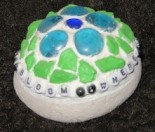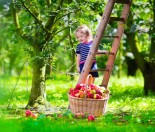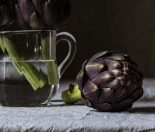Do you know where your food comes from? Do you know what has been done to it in order to get it to your table? Is it even in season? What about your vegetable peelings – what do you do with these?
In the hustle and bustle of family life it is so easy to grab what ever is on offer at the store, come home and whip up a nutritious and delicious meal for your family and clear up afterwards, scraping the waste into the bin, and then finally after a long day sit down and have a well earned cuppa tea.
The thing is, a lot of the fresh vegetables available from stores has come from a world away, is out of season, or has been treated in some way or other in order to get it to the stores looking as fresh and healthy as possible. Now there is nothing seriously wrong with this as fresh food is a better option for your family than fried food or the brightly coloured stuff that has chemical equations in the ingredients list.
However, I know a better way. Grow your own. My food has food miles of metres and it takes minutes to get it from the plant to the pot. (I’ve been known to run to the kitchen with fresh asparagus). I know what has been done to it because I have nurtured it since it was a tiny seed and squished any bug that dare look at it. If spraying is required then it is carefully researched and the friendliest version is used as a last resort.
Our diet is ruled by the seasons. You can’t grow tomatoes naturally in the winter, yet the stores have robbed us of the anticipation of that first fresh tomato. And you have to admit fresh is best, especially straight from the plant eaten right there in the garden. But in winter you can have turnips, which are surprisingly delicious and easy to grow but surprisingly hard to find in the stores.
Healthy plants that don’t need to travel great distances or be a uniform size, don’t need anything doing to them. Healthy plants grow out of healthy soil, and the best way to make healthy soil is to put your scraps into the compost instead of the landfill. Homemade compost is one of the richest ingredients you can add to your soil at the beginning of each season and it will reward you with the most incredible fresh flavours.
But then the benefits of gardening far out weigh the benefits of serving good quality food to your family and don’t get me started on the vitamins and antioxidants. Just being in a garden is healing and restorative. Studies have shown gardeners live longer more active lives. Time taken in a garden at the end of the day just tending the garden can result in a less stressed version of yourself. Meal planning and grocery shopping in the garden is a lovely calming experience and this contributes to a healthy happy home life.
Then of course you are able to reduce your impact on the planet – even if it is just a tomato plant in a pot on a high rise balcony, that is still one less tomato plant worth of tomatoes being shipped across the country in a truck belching fumes. It all counts.
Once you give it a good try, you’ll soon realise, growing your own food isn’t a hobby or the latest fad, it’s actually a really rewarding way of life.
For more expert advice on living sustainably, check out our I believe in sustainability section.






